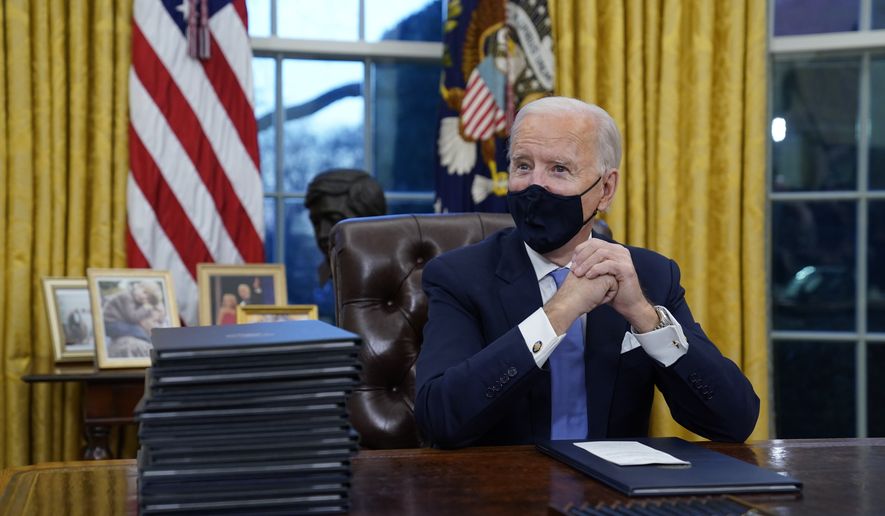President Biden on Monday signed an executive order to remove restrictions on transgender Americans joining the military, reversing a controversial Trump-era Pentagon policy.
Mr. Biden’s order comes just days after new Defense Secretary Lloyd Austin, who expressed support for reversing the transgender policy, assumed control at the Pentagon. The move was long expected to be one of Mr. Biden’s first executive orders.
While critics, including some former high-level military officers, slammed the development, the Biden administration staunchly defended it.
“President Biden believes that gender identity should not be a bar to military service, and that America’s strength is found in its diversity,” the White House said in a fact sheet laying out the new policy.
“America is stronger, at home and around the world, when it is inclusive,” the White House said, adding that Mr. Biden has directed Mr. Austin and the Department of Homeland Security — which oversees the U.S. Coast Guard — to implement the order that specifically “prohibits Involuntary separations, discharges, and denials of reenlistment or continuation of service on the basis of gender identity.”
Mr. Austin praised the development, asserting in a statement that the “military is in the business of defending our fellow citizens from our enemies, foreign and domestic” and that “we accomplish that mission more effectively when we represent all our fellow citizens.”
“This is the right thing to do,” the new defense secretary said. “It is also the smart thing to do.”
Some conservative groups disagree.
The Family Research Council, which describes itself as a “fundamentalist Protestant” organization, claimed Monday that “medical costs for service members with ‘gender dysphoria’” have a history of being higher than for other service members.
The Washington Times was not able to immediately verify that claim. But Tony Perkins, a Marine Corps veteran who heads the council, argued that Mr. Biden is “indulging dangerous and unproven theories that have the potential to undermine national security.”
Mr. Perkins lamented in a statement that Monday’s move will dangerously redirect “the military’s focus from where it has been and where it belongs — fighting and winning wars.”
Retired Army Lt. Gen. Jerry Boykin, the Family Research Council’s executive vice president added: “Every cent spent on this politically-correct exercise is money that could be used to prepare our troops for war.”
Retired Army Lt. Gen. Tom Spoehr, who heads the Center for National Defense at the Heritage Foundation, a conservative think tank, added in his own statement that “political correctness should never come before military readiness.”
But others heaped praise on the policy shift, casting it as a key step in moving the nation beyond the tumultuous and divisive Trump era.
“For years, transgender patriots were forced to continue to hide their identity while serving in our military. But today, thanks to President Joe Biden, Secretary Lloyd Austin, and pro-equality voters across America, they may live and serve openly as themselves,” said Alphonso David, president of the Human Rights Campaign, a leading LGBTQ civil rights organization. “The government will begin the process to eliminate an arbitrary and discriminatory executive action that has not only harmed transgender service members but our entire military.”
Mr. Biden’s order goes beyond addressing new recruits entering the Army, Navy, Coast Guard, Marines or Air Force. It also calls for the “identification and examination of the records of service members who have been involuntarily separated, discharged, or denied reenlistment or continuation of service on the basis of gender identity or under circumstances relating to gender identity.”
The Pentagon‘s transgender policy has gone through multiple overhauls over the past four years. During the final months of the Obama administration, then-Defense Secretary Ash Carter said transgender individuals already in the armed forces would be able to serve openly and no longer face the risk of discharge. The Obama administration also called for the Pentagon to allow transgender Americans to enlist.
But former President Trump upended that plan, declaring in July 2017 that transgender individuals could not serve in any capacity. By April 2019, the Pentagon had adopted a policy that prohibited transgender individuals and recruits from transitioning.
Many Pentagon officials have long argued that transgender Americans presented no problems for the military. “We have a finite number,” Joints Chiefs of Staff Chairman Gen. Mark Milley said in 2018 while serving as Army chief of staff. “We know who they are, and it is monitored very closely, because, you know, I’m concerned about that and want to make sure that they are, in fact, treated with dignity and respect.”
“I have received precisely zero reports” of problems, he said at the time.
• Guy Taylor contributed to this report.
• Ben Wolfgang can be reached at bwolfgang@washingtontimes.com.




Please read our comment policy before commenting.